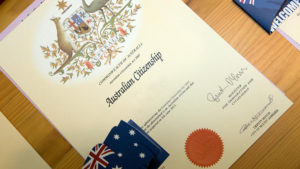Doubts raised over new citizenship rules
Plans by the federal government to dramatically change the requirements to become an Australian citizen have been questioned by a broad array of sectors led by businesses interests.
The draft legislation includes proposals to: extend the wait for permanent residents to four years (instead of one) before they are eligible to apply for citizenship; require most applicants to have a ‘competent’ instead of ‘basic’ proficiency in English; and enforce a new citizenship test, a pledge of allegiance to Australia and requirement to display Australian values.
The proposed citizenship changes don’t specify the new level of English competency required but Immigration Minister Peter Dutton has said it would equate to Level 6 of the International English Language Testing System (IELTS).
 There are concerns the extended permanent residency requirement will make Australia a less attractive business destination.
There are concerns the extended permanent residency requirement will make Australia a less attractive business destination.
The American Chamber of Commerce in Australia, led by former US diplomat Niels Marquardt, submitted to the inquiry that skilled American migrants would be put into ‘limbo’.
“I think it’s a step in the wrong direction,” Mr Marquardt said.
“The changes that have been announced really moves in the direction of making Australia somewhat less welcoming. I think that’s a mistake because Australia, like the United States, is definitely a country whose success has been built on a welcoming and selective immigration policy,” he said.
Human rights groups, lawyers and academics have also criticised the mooted move after changes to the Citizenship Act and Migration Act were flagged in April by the Turnbull government.
The Prime Minister said at the time citizenship is a privilege and the changes were necessary in the interest of national security and strengthening Australia’s multicultural character.
Director of the Language Testing Research Centre at the University of Melbourne Ute Knoch said in a submission to the parliamentary inquiry that the proposed requirements would disproportionately affect refugees and migrants with interrupted schooling.
“I’m perfectly sure that many migrants in Australia function very well with a much lower level of English in their own community networks,” Dr Knoch said.
“Many Australian universities only require an IELTS 6 for university entrance and I don’t think that’s appropriate considering that many of the immigrants, for example, may never need to study at an Australian university and will probably function really well in everyday life without such a high English level,” he said.
“You also need to remember that often there’s spouses that come along who look after the children all day and it just doesn’t make a lot of sense to have that requirement of them as well.
“We feel that that level is inappropriately high,” Dr Knoch said.
In another development Irish vet Dr Louise Kennedy failed to meet the requirements for a skilled migrant visa after she did not pass a language test, despite being a native English speaker and holding two degrees.
Dr Kennedy has been working in Australia for two years as an equine veterinarian and is married to an Australian.
The veterinarian profession is on the Australian government’s skilled occupation list. There’s currently a shortage of equine vets, particularly in Queensland.
The immigration department said on Thursday migration regulations do not require Irish nationals to sit an English language test to meet the requirements for that specific visa.
Dr Kennedy told SBS World News she only had 45 points without sitting the language test.
Passing the ‘Superior English’ test would have met the requirement but she failed the component as she only got a score of 10.
Dr Kennedy undertook the computer-based Pearson Test of English Academic (PTE Academic), which was approved by the Australian Government’s Department of Immigration and Border Protection in 2014.
But the test uses voice recognition technology which apparently had difficulty with Dr Kennedy’s Irish accent.
Some groups have proposed a grandfathering arrangement where those already undertaking the citizenship process are exempted from the new requirements.
Immigration lawyer Matthew Amoils told media outlets the changes could create two classes of permanent residents.
“Whether intended or unintended, consequences of the proposed changes now are that, for many people, it’s going to be a minimum of six to eight years before they can become citizens, or are eligible to apply for citizenship,” Mr Amoils said.
“We don’t think that does anything that benefits Australia or creates social cohesion.”
He said the extended waiting period becoming a potential drain on the flow of skilled migrants to Australia.
“In certain cases, high-level jobs require security clearances that can only be given to Australian citizens and we have a couple of clients in that position,” said Mr Amoils, of ASG Immigration.
“They were expecting to be able to apply for citizenship within the next six months and then apply for top-level security jobs and that rug is going to be pulled out from under their feet.”
Many of the 463 submissions to the Senate Legal and Constitutional Affairs inquiry raised concerns about the disproportionate impact the proposed changes would have on vulnerable refugees and those with interrupted schooling.
There are concerns genuine refugees who have been granted protection visas, and thus permanent residency, will be forced into a long wait for citizenship.
Laurie Nowell
AMES Australia Senior Journalist












